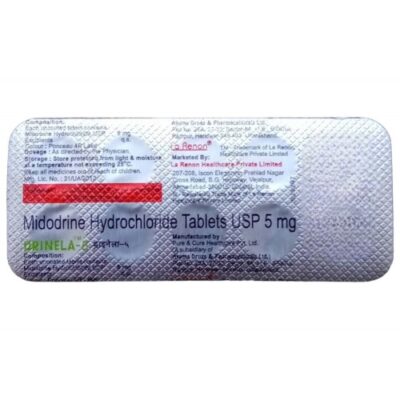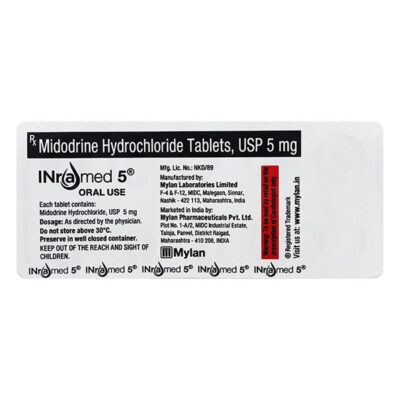🩺⬆️💊 Midodrine 5mg Tablet: Targeted Treatment for Low Blood Pressure (Orthostatic Hypotension)
Midodrine 5mg is a vasopressor medication used primarily to treat orthostatic hypotension, a condition in which a person experiences a significant drop in blood pressure upon standing, leading to dizziness, lightheadedness, fainting, and fatigue. This medication helps raise blood pressure by constricting blood vessels, thus improving blood flow to vital organs, particularly the brain. Midodrine is most commonly prescribed to patients with autonomic nervous system disorders, including those caused by Parkinson’s disease, diabetic neuropathy, and multiple system atrophy.
🔬 Mechanism of Action
Midodrine is a prodrug, which is quickly converted in the body to its active form, desglymidodrine. This metabolite is a selective alpha-1 adrenergic receptor agonist that works by:
-
Causing vasoconstriction (narrowing of blood vessels)
-
Increasing peripheral vascular resistance
-
Raising systolic and diastolic blood pressure when in upright positions
Unlike some blood pressure medications, Midodrine does not cross the blood-brain barrier, so it typically does not cause central nervous system side effects like drowsiness or confusion.
📌 Indications and Uses
Midodrine 5mg is used for:
-
Symptomatic orthostatic hypotension
-
Neurogenic hypotension (due to nervous system dysfunction)
-
Dialysis-induced hypotension (in select cases, off-label)
-
Low blood pressure after spinal cord injury
-
May also be used off-label in hepatorenal syndrome and shock under supervision
It is particularly effective in patients who do not respond well to lifestyle modifications like fluid intake and compression garments.
💊 Dosage and Administration
-
Typical starting dose: 2.5mg to 5mg three times daily
-
Can be titrated up to 10mg three times daily, as needed and tolerated
-
Should be taken during the daytime hours (morning, midday, early evening)
-
Avoid taking the dose within 4–5 hours of bedtime to reduce risk of supine hypertension (high BP while lying down)
Tablets should be swallowed whole with water, with or without food.
⚠️ Precautions and Warnings
-
Contraindicated in:
-
Severe heart disease
-
Supine hypertension (high BP while lying down)
-
Urinary retention
-
Thyrotoxicosis (overactive thyroid)
-
Severe kidney disease
-
-
Monitor:
-
Blood pressure both sitting and standing
-
Kidney function
-
Heart rate (risk of reflex bradycardia)
-
Use with caution in elderly patients and those with prostate issues.
🤒 Side Effects
Common:
-
Goosebumps or chills
-
Tingling or itching of the scalp
-
Increased urinary urgency
-
Headache
Serious/Rare:
-
Supine hypertension
-
Bradycardia (slow heartbeat)
-
Urinary retention
-
Paresthesia or numbness
If symptoms of excessive high blood pressure, chest pain, or difficulty urinating occur, contact a physician immediately.
🔄 Drug Interactions
-
Use caution with:
-
Other vasopressors (e.g., epinephrine)
-
Beta-blockers (may worsen bradycardia)
-
Monoamine oxidase inhibitors (MAOIs)
-
-
Avoid alcohol, which can worsen hypotension
🧊 Storage Instructions
-
Store at 20–25°C, away from moisture and light
-
Keep out of reach of children
📝 Conclusion
Midodrine 5mg is a targeted therapy that effectively manages chronic orthostatic hypotension, helping patients maintain blood pressure, reduce dizziness, and regain physical function. When used under proper medical supervision, it provides a valuable option for improving quality of life in those suffering from low blood pressure due to autonomic dysfunction.
Note: This information is intended for educational purposes and should not replace professional medical advice. Always consult a healthcare provider for personalized guidance.




Reviews
There are no reviews yet.